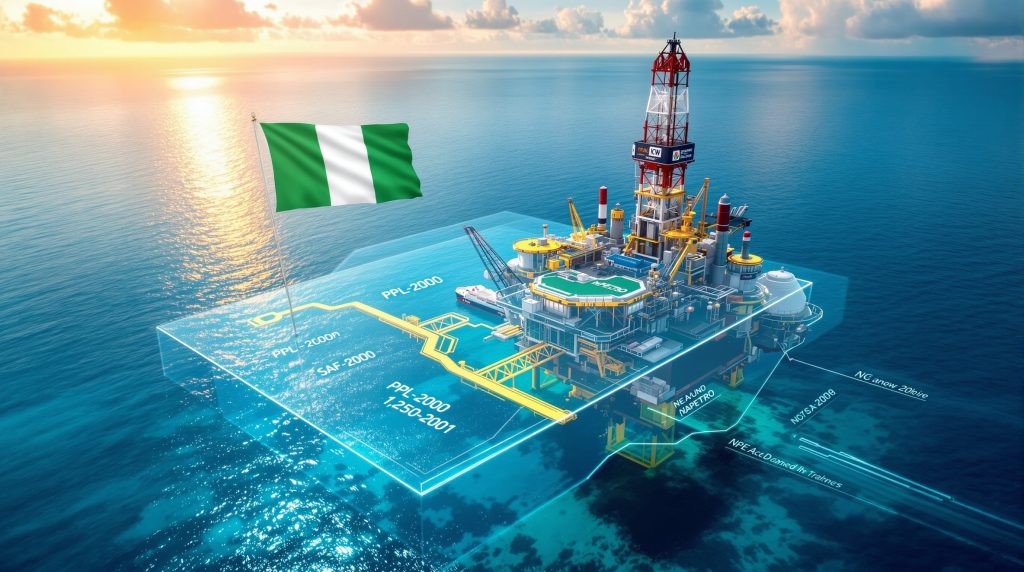Nigeria's Deepwater Oil Strategy: Unlocking New Frontiers with TotalEnergies and SAPETRO
Nigeria has strategically strengthened its offshore energy portfolio through a landmark deepwater production-sharing contract (PSC) with TotalEnergies and South Atlantic Petroleum (SAPETRO). This agreement targets offshore blocks PPL-2000 and PPL-2001 in the Niger Delta Basin, representing a pivotal development in the country's efforts to revitalize its hydrocarbon sector and enhance energy security.
The partnership structure assigns TotalEnergies an 80% contractor interest as operator, while indigenous firm SAPETRO holds the remaining 20%. This collaboration exemplifies Nigeria's dual focus on attracting international expertise while promoting local industry participation.
Strategic Location and Resource Potential
The newly awarded blocks cover approximately 2,000 square kilometers of deepwater territory, with PPL-2000 spanning 969 square kilometers and PPL-2001 covering 960 square kilometers. These assets feature water depths between 1,250 and 2,000 meters, positioning them within a highly prospective yet underexplored segment of one of Africa's most prolific hydrocarbon regions.
Despite the Niger Delta Basin's established production history, these deepwater zones remain relatively untapped, offering significant potential for new discoveries. The agreement marks the first exploration award to an international oil company in Nigeria in a decade, highlighting renewed investor confidence in the country's upstream sector.
Geological Advantages
The targeted blocks lie within the prolific Niger Delta petroleum system, which has demonstrated:
- Multiple proven reservoir formations at varying depths
- Effective source rock with high-quality hydrocarbon generation
- Excellent structural and stratigraphic traps
- Favorable pressure and temperature conditions for hydrocarbon accumulation
Industry experts note that deepwater blocks often present fewer development challenges than onshore or shallow-water assets, with reduced community issues and security concerns that have historically hampered production in other parts of Nigeria.
Key Terms and Regulatory Framework
The PSC is regulated by the Nigerian Upstream Petroleum Regulatory Commission (NUPRC), led by Chief Executive Gbenga Komolafe. He has characterized the agreement as part of a "committed work programme" designed to expand reserves, increase production, and strengthen Nigeria's long-term energy security.
This agreement represents one of the first major contracts implemented under the 2021 Petroleum Industry Act (PIA), which has significantly reformed Nigeria's oil and gas fiscal and regulatory framework. The PIA has established more transparent, efficient, and attractive terms for international investors while preserving national interests.
Local Content Development
An important aspect of the agreement involves commitments to Nigerian content development, including:
- Technology transfer initiatives
- Training programs for local personnel
- Utilization of Nigerian goods and services
- Community development projects in host communities
These provisions align with Nigeria's broader economic development goals while ensuring that the benefits of resource extraction extend beyond direct revenue generation.
Nigeria's Energy Security Challenges
For Africa's largest oil producer, the agreement arrives at a critical juncture. Nigeria's upstream sector has weathered years of underinvestment, declining oil production volumes, and persistent crude theft. With current output still below its OPEC quota, deepwater developments represent a strategic pathway to reversing this trend and stabilizing government revenues.
TotalEnergies' involvement signals renewed confidence in Nigeria's regulatory environment following the implementation of the 2021 Petroleum Industry Act (PIA). This legislation overhauled fiscal terms and improved transparency, creating a more attractive investment strategy climate for international operators.
Production Recovery Strategy
Nigeria has implemented a multi-faceted approach to reverse production declines:
- Deepwater focus: Prioritizing offshore blocks with lower security risks
- Infrastructure security: Enhanced protection for pipelines and facilities
- Regulatory reforms: Streamlined approval processes and improved fiscal terms
- Indigenous participation: Greater involvement of Nigerian companies in operations
The PSC with TotalEnergies and SAPETRO represents a cornerstone of this recovery strategy, potentially adding significant volumes to Nigeria's production capacity in the coming years.
Industry Dynamics and Investment Climate
The agreement reflects a larger industry trend where international oil majors have gradually shifted focus away from onshore and shallow-water assets in Nigeria due to security concerns. These companies have instead concentrated on expanding deepwater positions that offer scale, lower disruption risk, and higher profitability potential.
For investors, the deal illustrates both the challenges and opportunities within Nigeria's energy sector—a high-risk environment with considerable rewards for organizations capable of navigating its complexities. For the Nigerian government, it marks another step in aligning resource development with the twin imperatives of energy security and economic resilience.
Investment Risk-Reward Profile
Nigeria's deepwater sector offers a compelling investment case based on several factors:
- Resource potential: Significant untapped hydrocarbon resources
- Fiscal terms: Improved terms under the PIA
- Political stability: Relative improvement in governance and policy consistency
- Existing infrastructure: Proximity to established production facilities and export routes
- Technical expertise: Accumulated knowledge from previous deepwater projects
However, investors must also navigate challenges including:
- Regulatory delays in approvals and permitting
- Currency exchange risks and repatriation issues
- Regional security concerns, though less prevalent offshore
- Environmental compliance requirements
- Changing global market impacts from energy transition dynamics
Expected Development Timeline
The contract for PPL-2000 and PPL-2001 will likely trigger a multi-phase development approach:
Phase 1: Initial Assessment (12-18 months)
Comprehensive seismic studies to map subsurface structures and identify potential hydrocarbon accumulations. This phase typically includes:
- 3D seismic acquisition and processing
- Geological and geophysical studies
- Prospect identification and ranking
- Environmental baseline studies
Phase 2: Exploration Drilling (18-24 months)
Testing the most promising prospects to confirm commercial viability through:
- Drilling of 1-3 exploration wells
- Formation evaluation and testing
- Reservoir fluid analysis
- Preliminary resource estimation
Phase 3: Appraisal Program (12-24 months)
Determining the extent and characteristics of any discoveries via:
- Additional appraisal wells
- Extended well testing
- Detailed reservoir modeling
- Updated resource estimation
Phase 4: Development Planning (12-18 months)
Engineering and economic analysis for optimal field development, including:
- Conceptual engineering studies
- Front-end engineering design (FEED)
- Economic modeling and project sanctioning
- Regulatory approvals and environmental permits
Phase 5: Production Infrastructure (36-48 months)
Installation of platforms, subsea systems, and export facilities, culminating in:
- Drilling of production and injection wells
- Installation of subsea equipment and flowlines
- Construction of floating production systems
- Commissioning and start-up activities
If successful, these projects could materially increase Nigeria's reserves and contribute significantly to the country's medium-term production targets over the coming years.
Nigeria's Broader Energy Strategy
The agreement represents a tangible outcome of reforms initiated under President Bola Tinubu's administration and the 2021 Petroleum Industry Act. These reforms aim to transform Nigeria into a premier destination for upstream investment in Africa by creating a more transparent, efficient, and attractive regulatory framework.
Gas Monetization Focus
Although the PSC primarily targets oil production, Nigeria has declared natural gas development a national priority through its "Decade of Gas" initiative. This policy seeks to:
- Increase domestic gas utilization for power generation
- Reduce gas flaring and capture associated gas
- Expand LNG export capacity
- Develop gas-based industries including fertilizer and petrochemicals
The deepwater blocks under the new PSC could potentially contribute to these gas development goals if significant gas resources are discovered alongside oil.
Balancing Short and Long-term Objectives
While pursuing immediate production increases, the PSC also addresses longer-term considerations through local content requirements, technology transfer provisions, and environmental protection measures—balancing economic imperatives with sustainability goals.
Deepwater Operations: Technical and Environmental Considerations
Technical Challenges
Developing oil and gas resources in water depths of 1,250-2,000 meters presents significant technical challenges that require specialized expertise:
- High-pressure, high-temperature reservoirs: Requiring specialized equipment and materials
- Subsea infrastructure: Complex installation and maintenance in deep water
- Flow assurance: Managing potential hydrate formation and wax deposition in deepwater flowlines
- Limited intervention options: Higher costs for well workovers and maintenance
- Weather vulnerability: Susceptibility to tropical storms and hurricanes
Environmental Management
Deepwater operations must adhere to strict environmental standards including:
- Comprehensive Environmental Impact Assessments (EIAs)
- Oil spill prevention and response plans
- Monitoring programs for marine ecosystems
- Reduced emissions and zero-routine flaring commitments
- Decommissioning provisions for end-of-life facilities
TotalEnergies brings significant experience in managing these aspects from its global deepwater portfolio, including existing operations in Nigeria.
Nigeria's Oil Industry: Current Status and Future Outlook
Current Production Status
Nigeria's oil production has faced significant challenges in recent years:
| Year | Average Production (million bpd) | OPEC Quota (million bpd) | Compliance Rate |
|---|---|---|---|
| 2020 | 1.57 | 1.77 | 88.7% |
| 2021 | 1.42 | 1.82 | 78.0% |
| 2022 | 1.25 | 1.84 | 67.9% |
| 2023 | 1.38 | 1.86 | 74.2% |
| 2024 | 1.46 | 1.88 | 77.7% |
Source: Industry estimates based on public data
Future Outlook
The Nigerian government has set ambitious targets for the oil and gas sector:
- Increase oil production to 2.2 million barrels per day by 2027
- Grow proven reserves from current 37 billion barrels to 40 billion barrels by 2030
- Reduce production costs below $15 per barrel
- Eliminate routine gas flaring by 2030
The success of deepwater projects like the TotalEnergies-SAPETRO PSC will be crucial to achieving these objectives and securing Nigeria's position as a major global energy supplier.
FAQs: Nigeria's Deepwater Oil and Gas Development
What makes deepwater exploration different from shallow water or onshore operations?
Deepwater exploration involves operating in water depths exceeding 1,000 meters, requiring specialized drilling technology, subsea infrastructure, and significantly higher capital investment. These projects typically offer larger field sizes and reduced security risks compared to onshore operations but face greater technical challenges and longer development timelines.
How significant is Nigeria in the global oil market?
Nigeria remains Africa's largest oil producer and a significant global supplier, with proven reserves exceeding 37 billion barrels. As an OPEC member, the country plays an important role in global supply dynamics, though oil price stagnation and production challenges have recently limited its ability to meet assigned quotas.
What role does NNPC Limited play in this agreement?
The Nigerian National Petroleum Company Limited serves as the concessionaire under the PSC, representing the government's interests. NNPC will also market the new PSC model to attract further investment from international operators seeking to enter or expand their presence in Nigeria's deepwater sector.
How might this agreement impact local communities?
The PSC includes provisions for community development and environmental protection. Additionally, the involvement of indigenous company SAPETRO creates pathways for local employment, supplier opportunities, and skills development that can benefit communities in Nigeria's oil-producing regions.
Disclaimer: This article contains forward-looking statements and industry projections based on current information. Actual developments may differ significantly from these projections due to various factors including market conditions, regulatory changes, technical challenges, and oil price movements related to global energy transition dynamics. Readers should not consider this content as investment advice or definitive forecasts of future outcomes.
Ready to Invest in the Next Major Discovery?
Stay ahead of the market with Discovery Alert's proprietary Discovery IQ model, which instantly notifies investors of significant ASX mineral discoveries and turns complex data into actionable insights. Discover why major mineral findings can lead to substantial returns by exploring the dedicated discoveries page.




